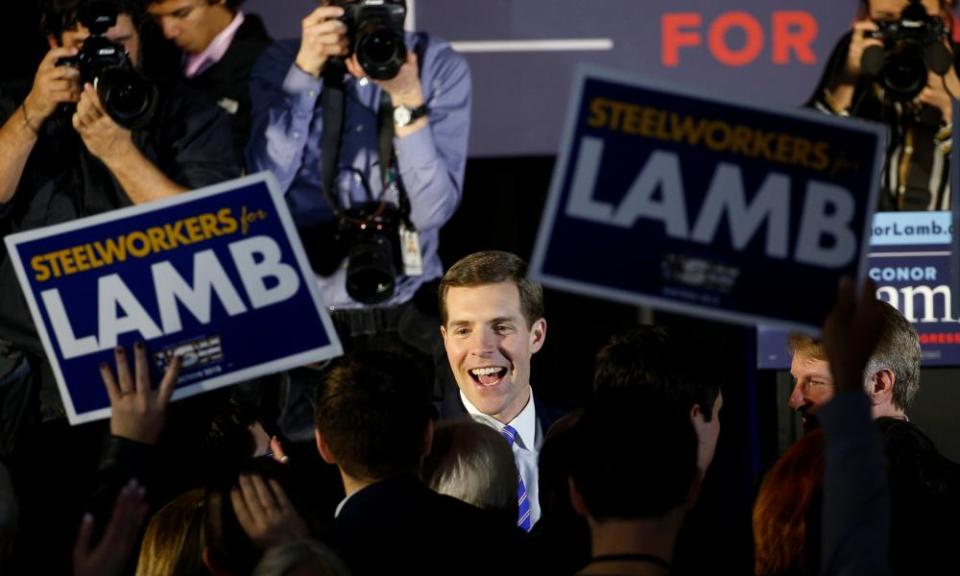Is Pennsylvania a prelude for what's to come for Republicans?
Democrat Conor Lamb has appeared to win in a district Trump carried by 20 points in 2016. What does this portend for the midterm elections?

On Tuesday, Pennsylvania’s 18th congressional district appeared to send Democrat Conor Lamb to Washington. Lamb may have won by only a whisker, a fraction of a percentage point and several hundred votes. Officially, the result are still too close to call, but Democrats have already claimed victory. The impact of this result was seismic.
As ex-Vice President Joe Biden presciently framed things in the election’s run-up, “I promise ya, if Lamb wins you’re going to see a half-dozen Republicans say, ‘I’m not running again.’” For Donald Trump and the Republican party, Lamb’s apparent win ominously portends what may come next as the clock ticks down to November’s midterm elections.
Republican Rick Saccone’s loss was about President Trump, the anger that he engenders among Democrats and the discomfort and disillusionment that now stirs his own voters. Make no mistake, Tuesday’s election was a personal rebuke of Trump. It should never have been this close, but it was.
Trump had won the 18th congressional district by 20 points, more than John McCain in 2008 or Mitt Romney in 2012. The last time a Democrat represented the district was more than 15 years ago. Nestled in the Keystone State’s south-west corner, outside of Pittsburgh, this wasn’t just Trump Country. Rather, it was also a reliably and irregularly shaped deep red patch, one that voted Republican in each of the last five presidential elections.
Yet, low unemployment and Republican-backed tax cuts were not enough to divert the electorate’s attention from Trump and his constant chaos. All of House Speaker Paul Ryan’s Pac money couldn’t buy a different outcome. Saccone’s defeat was more than a wake-up call; it was a four-alarm fire.
The Democrats had prevailed in a district that is virtually monochromatic; nearly 96% of its voters are white. Lamb triumphed by peeling off working-class votes, and making serious inroads in Republican strongholds as election night maps showed. According to pre-election day polling, college graduates and women probably hauled Lamb across the finish line.
Having witnessed all this, the Republicans should be scared – and they already are. One survey shows that in the 23 congressional districts won by Hillary Clinton but held by a Republican, only two incumbents said that they would be happy to have Trump’s support, and one of them is California’s Dana Rohrabacher, the congressman who actually met face-to-face with WikiLeaks’ Julian Assange. In for a penny, in for a pound.
Republican reluctance to stand by Trump in swing districts is understandable. His recent campaign-styled public appearances have been pure spectacle. Last Saturday night, in a tableau better befitting someplace other than the Land of the Free and the Home of the Brave, the president lauded foreign autocrats, trashed America’s press corps, and praised himself. Saccone was merely an afterthought, one who ultimately denounced his opponents as hating God, Trump, and Country, a holy trinity of sorts.
Democrats should smile, not gloat. Winning one special election is not the same thing as recapturing the House of Representatives. Heavy lifting lies ahead.
Practically speaking, they need to replicate candidate Lamb elsewhere by recruiting candidates who are tailor-made for their respective districts, a tall but not impossible order. As one New York mayor told the Guardian, the Democrats can’t expect that “every district is left-leaning Berkeley”.
As for Lamb, he was well-suited for the task. An ex-marine and former federal prosecutor, Lamb is socially centrist and economically realistic. For his efforts, the Ivy League-educated Democrat received the backing of the steel workers’ and mine workers’ unions.
In a district where hunting is taken seriously and steel mills once dotted the skyline, Lamb reminded voters of his Catholic schooling, and voiced his personal opposition to abortion and to wholesale revision of gun laws. He also approved of tariffs on imported steel and aluminum, balked at unconditionally backing the Dream Act, and announced his opposition to a single-payer healthcare system. Tellingly, Lamb said little about the president.
Special elections can portend what comes next. In 1991, Pennsylvania held one to fill the vacancy left by the tragic and accidental death of Senator John Heinz, who himself had previously represented what is now the 18th congressional district.
The race pitted Republican Dick Thornburgh, a former governor and US attorney general, against Democrat Harris Wofford, a member of the Kennedy administration and former university president. Wofford won in a landslide, and a year later the public turned George HW Bush out of office. In politics as in life, past can be prelude.
Lloyd Green is an attorney in New York. He was opposition research counsel to George HW Bush’s 1988 campaign and served in the Department of Justice from 1990 to 1992.

